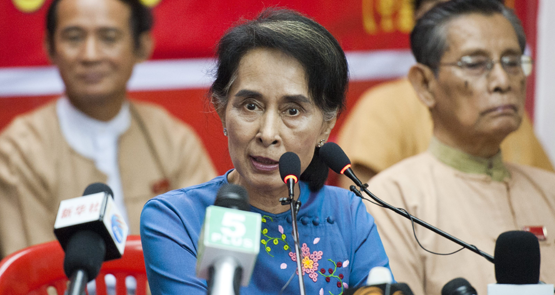
Only a year ago there was serious speculation that Myanmar’s military-backed government may delay quinquennial elections due at the end of 2015. Yet it did not, proceeding with a poll when it was almost certain it would lose to Aung San Suu Kyi’s National League for Democracy (NLD).
The NLD went on to crush not only the ruling Union Solidarity and Democratic Party but all other opponents, bar those in restive Rakhine state, winning an astonishing 80% of the vote. Yesterday, Suu Kyi entered Myanmar’s lower house to mark the beginning of the nation’s new parliament.
It’s the first concrete and very positive step in what increasingly — albeit still tentatively, given the Myanmar military’s history of reneging on elections — looks to be a peaceful handover of power.
There’s much to celebrate in the new parliament, not least the triumph of Suu Kyi herself, who has sacrificed so much personally for a country that she left aged two, and did not return to until she was in her 40s.
When she led her newly minted fellow legislators into the nation’s parliament in Nay Pyi Taw it was a moment that she had waited 26 years for — ever since the then-junta simply ignored the results of the 1990 election when she also won a landslide.
Still, there are a great many unknowns in Myanmar, among which are its problems of grinding poverty and shockingly bad infrastructure in most of the country — large swathes of Myanmar’s official population of 50 million still live without electricity. The country is also still embroiled in a number of civil wars of varying intensity. The most serious of these is in Kachin State.
The still very powerful military (which holds the guns) is guaranteed not only 25% of the seats in both houses of federal parliament, and all the state and divisional legislatures, it is also guaranteed the cabinet portfolios of defence, border affairs and home affairs — in effect, the three ministries that deal with public security both internationally and internally.
The military-backed government made a show of signing a “peace” accord with a number of ethnic militias but the real trouble spots, in states like Kachin, Rakhine and Wa, have not been fixed and those groups have not signed up.
So the NLD, while victorious, is, in effect, power-sharing with the military. And then there is the elephant in the room: who will be president? Suu Kyi is banned by the infamous Suu Kyi clause in the 2008 constitution that forbids people with foreign spouses or children — she has had both — from becoming president.
The woman they call The Lady has already said no matter who is president — the NLD has the numbers to choose who — she will be ”above the president”; in effect, a puppetmeister. While this is hardly the rule of law that the NLD has fought so hard to have as the basis for the country’s government, it is, for now, a negotiating tactic to see if she can push to have the clause either overturned or ignored. Just what other concessions she might trade for this is another unknown (at the risk of sounding like Donald Rumsfeld).
One local media outlet in Myanmar reported yesterday that she was in talks with the military about this. Of course she has been, but we will not know for a week or two when the NLD announces its nominations for the post. The new president must take office by April 1.
But Suu Kyi’s fate — she had already sealed her place in history for what that is worth — pales into insignificance against that of the ethnic Muslim Rohingyas and hundreds of thousands of other internally displaced persons living in camps across the far-flung provinces of the country and across the border in Thailand’s west.
They are very much on the sidelines, almost completely ignored by the NLD.
There are camps of internal refugees left homeless by wars in Kachin state in the north, but also from older conflicts in Karen and Kayah states.
Of Myanmar’s more than 1 million dispossessed, it is the Rohingya, whose population numbers somewhere between 800,000 and 1.3 million, who are the most oppressed, by and large refugees without citizenship and stripped of any voting and many civil rights.
They live in the western province of Rakhine state, which borders Bangladesh, a country just as poor, according to various estimates. About 200,000 of them live on the outskirts of Sittwe, the island capital of Rakhine state where there is effective apartheid in operation with security forces stopping anyone from leaving and checking on all people who enter. None of this looks like changing any time soon, despite the new government in Nay Pyi Taw.
As we rightly celebrate something of a new dawn in a country that not so long ago was an international pariah, it’s a reminder that the road ahead for Myanmar is long and hard.








She is Burman, first & foremost, and they consider all other folk losers in the birth stakes.
She already has more clay feet than a ceramic centipede.
Whoever opined, “Put not your Faith in Princes, oh Prince” would no doubt extend that to “Princesses”.
Certainly in this specific case.